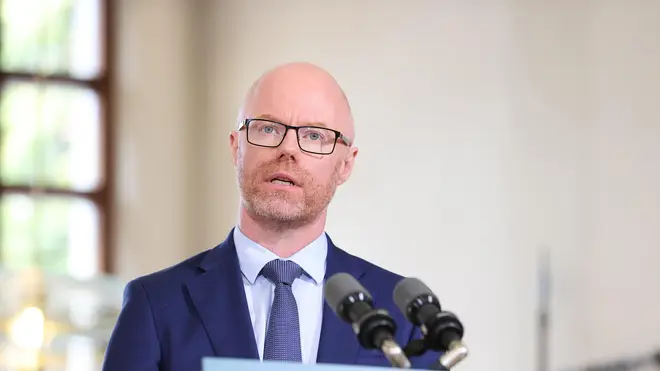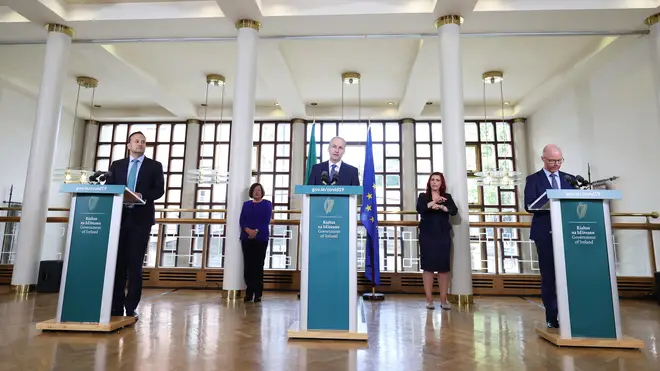
Ian Payne 4am - 7am
15 September 2020, 17:54 | Updated: 7 June 2023, 08:56

Ireland's health minister has tested negative for coronavirus after the nation's entire cabinet had to go into self-isolation after he reported feeling unwell.
Stephen Donnelly fell ill following a cabinet meeting earlier today, and had to undergo tests.
Meanwhile, Parliament was suspended and the cabinet had to restrict their movements - although these measures have now been lifted.
The result of the negative test was made shortly after 9pm this evening.
Ceann Comhairle (speaker) Sean O Fearghail made the announcement in the Dáil on Tuesday evening.
He said: "I have very serious information. I'm told that arising out of events today, the Cabinet must now self-isolate.
"Therefore the possibility of proceeding with business does not arise and the house stands adjourned, I suspect, until Tuesday next.
"Or until I'm directed by the Taoiseach to reconvene the house. So Dail adjourned until further notice."

Mick Fealty on Irish Cabinet's self-isolation
The news comes after Mr Donnelly appeared in a press conference this afternoon, in which the 'blueprint' for living with coronavirus in Ireland was unveiled.
The Cabinet signed off on the medium-term plan for living with coronavirus, which includes different levels of restrictions, ranging from one to five.
Tighter restrictions have also been announced for Dublin, which has seen a continuous rise of Covid-19 cases in recent weeks.
Every county will remain at level two, however the capital will be subjected to a series of additional measures, including a requirement for pubs that do not serve food to remain closed when those in the rest of the country open next week.
The new plan for restrictions will come into effect from midnight on Tuesday.
The plan is broken into five alert levels and will be used for the next six months.

At level two, crowds of 200 will be allowed to attend sporting events at stadiums that have capacity for at least 5,000.
Taoiseach Micheal Martin said the extra restrictions the Government was announcing for the capital related to keeping the "wet" pubs closed when the rest reopened around the country on September 21.
He said people in Dublin would also not be able to attend sporting events in the same numbers permitted in the state's other 25 counties.
A maximum of six people from one household is permitted to visit another household under the new rules in Dublin.
However, the current level allows people to have gatherings in their homes and gardens of six people from no more than three other households in the rest of the country.
"We must continue to live with the reality that Covid-19 is potentially deadly, causes long-term illness, and we must limit the spread," Mr Martin said.
"When the vaccine is available we will move quickly to implement a widespread vaccination programme, however I want people to understand that even before then, we can go much further in opening up economic, social and cultural life in our country.
"This is a plan which gives clarity about each of our responsibilities and how different situations and sectors will be handled.
"It includes concrete measures which address both well established and emerging issues.
"It shows how we can limit the impact of the virus while keeping our schools open, protecting and expanding employment, reopening services and supporting social and cultural activity."
Mr Martin described the plan as "broad and comprehensive".
He added it has three core pillars: protecting health, strengthening employment and supporting communities.
"Underpinning this is a new approach to the ongoing management of the Covid response and clarity for people about what will happen in different scenarios," Mr Martin explained.
"Protecting public health remains an absolute clarity. The plan sets out the clear public health guidance which we should all follow.
"We must never forget the fact that the virus is still here and each of us has a personal responsibility to try to limit its spread.
"This new phase involves the introduction of a new framework for restrictive measures.
"There will be a heightened system of monitoring and enforcement to guide this rapid and targeted response to outbreaks and we will move decisively to address the fact that there are other health concerns which must be addressed."
He said the current Covid-19 cases in Dublin are "very worrying".
Appealing to residents in Dublin, he said: "Rising rates of infection can be reversed by concerted public action, and by all this adhering to the guidance and taking personal responsibility."
He also said the Government has decided to "broadly support" the European Commission proposals on travel.
A new group chaired by the secretary general of the Taoiseach's department, will oversee advice from the National Emergency Public Health Team (Nphet).
Mr Donnelly said Dublin was not being pitted against the rest of the country.
"This isn't about Dublin versus anywhere else," he said.
"Moving from level two to level three has a serious impact on jobs, it has a serious impact on how we can live our lives."
The Health Minister said Nphet was urging people in Dublin to keep gatherings limited to people from just one extra household.
"We're all watching what's going on in Dublin, the people of Dublin understand that the situation is escalating very, very quickly and people in Dublin, I think, welcome the public health doctors providing this advice," he said.